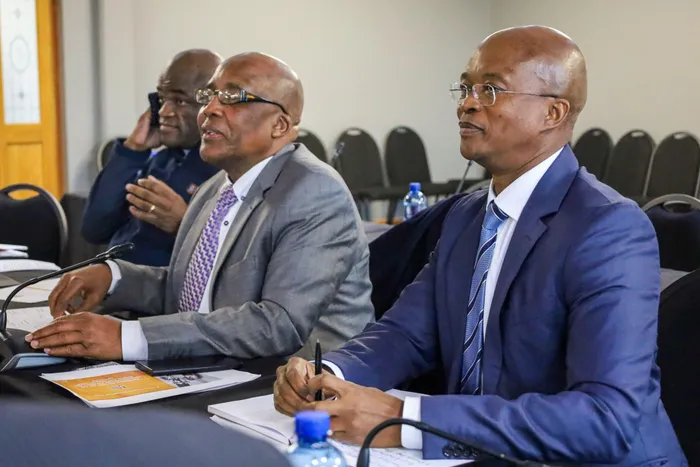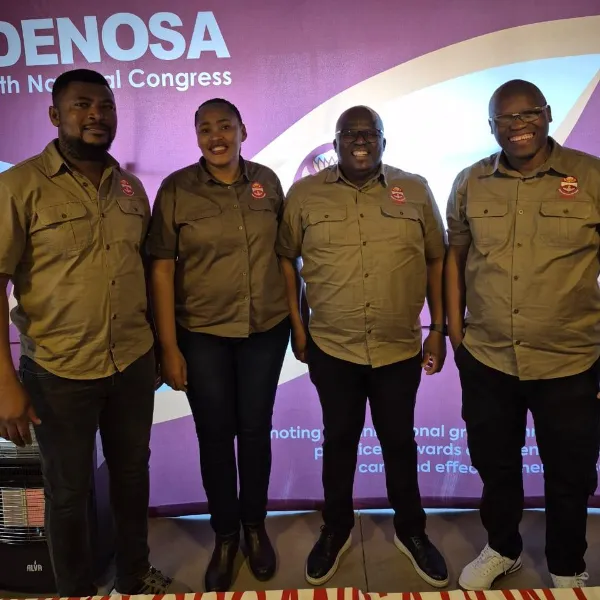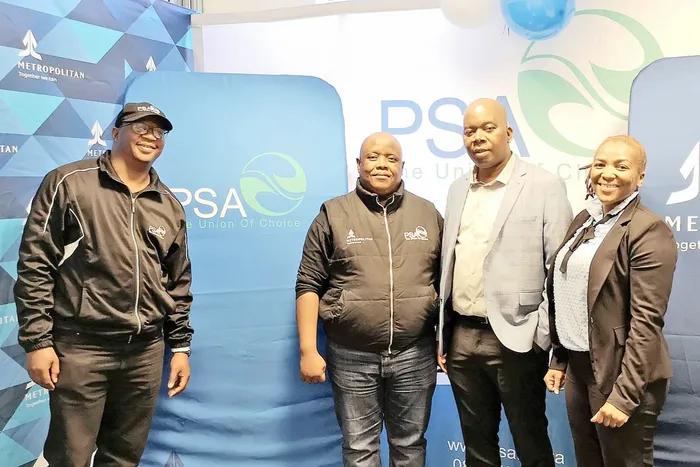No holy cows, no sacrificial lambs, warn health unions

The Minister of Health, Aaron Motsoaledi (centre), met with Premier Zamani Saul (left) and Health MEC Maruping Lekwene (right) on August 8.
Image: Supplied/ Northern Cape Provincial Government
THE DEMOCRATIC Nursing Organisation of South Africa (Denosa) has warned that political heads — not only doctors and nurses — should roll following the release of damning findings into the deaths and complications suffered by psychiatric patients treated at the Northern Cape Mental Health Hospital (NCMHH) and the Robert Mangaliso Sobukwe Hospital (RMSH) in Kimberley during 2024.
Minister of Health Dr Aaron Motsoaledi, who commissioned the Health Ombudsman’s investigation, met with Northern Cape Premier Dr Zamani Saul, MEC for Health Maruping Lekwene, MEC for Finance Venus Blennies-Magage, the director-general of the province, and the Department of Health management in Kimberley on August 8.
A spokesperson for the national Department of Health, Foster Mohale, said Motsoaledi also met with health unions Denosa, Hospersa, Nupsaw, Nehawu and the PSA.
“The labour unions were unhappy that some of their members were fingered in the Health Ombud’s report for failing to perform certain professional clinical functions with due diligence.”
Mohale explained that the minister informed them that he was not an appeals authority and could not review the Health Ombud’s report.
“The minister further indicated that the law prescribes that once a person lodges an appeal, the minister must set up a three-member tribunal to be chaired by a retired judge or a retired magistrate. The other two members may either be health professionals or legal professionals. The minister has advised aggrieved labour unions of the procedures that must be followed if they are dissatisfied.”
He added that Motsoaledi also briefed the unions on steps that would be taken to improve staffing, procure beds and linen, and hire health workers.
“By and large, the findings have to do with issues relating to human resources, procurement, clinical protocols and practices inside the hospitals themselves,” said Mohale.

The provincial leadership of Denosa.
Image: Supplied / Denosa
Denosa provincial chairperson Eugene Gilbert Sak described it as “alarmingly dismaying” that blame was being placed on the shoulders of nurses and doctors while leadership appeared to be offered immunity.
“The posture of the Department of Health seems skewed towards exonerating the provincial leadership and departmental officials from accountability and responsibility. Denosa will leave no stone unturned to ensure accountability and responsibility is unbiased and that there shall be no holy cows,” said Sak.
He urged Premier Zamani Saul not to exclude high-ranking health officials from scrutiny.
“The provincial leadership, which includes but is not limited to the MEC for Health Maruping Lekwene and various acting HODs who occupied this portfolio during the periods under review, must be subjected to the same investigations and appropriate remedial actions.”
Sak said the union would not allow its members to become “sacrificial scapegoats of patronage”.
“The findings and recommendations of the Office of the Ombudsman are succinct — that the departmental systemic failures and instability of provincial leadership attributed to and predisposed these institutions to the unfortunate demise of two patients, including the numerous findings made during investigations and articulated within the report. The report found both clinicians and the department’s provincial leadership to be equally accountable for the deaths of patients.”
He called for immediate measures to ensure adequate staffing and skills, the provision of resources and equipment, and safe, decent working conditions.
“Support must be provided for education, professional development, and investment in the mental health and well-being of nurses.”
Sak added that the leadership of Denosa had on numerous occasions raised the challenges that were confronting the healthcare system in the Northern Cape with the provincial leadership, especially the deteriorating state of the system.
He stated that all chief directors, including some directors, have been acting in their positions for more than 24 months.
“We have made a diagnosis of the multi-organ system failures a long time ago. A major cause of health system challenges is the centralised financial delegation to the Office of the HOD.
“The severe staff shortages started in 2016/17 when 1,000 clinical posts were abolished. Recruitment processes are always outside the framework of the recruitment policy and take over a year to conclude. Replacement posts remain vacant until there is no more funding and are consequently terminated.”
He said there were about 2,800 nurses in the province serving 1.37 million patients.
“This translates to a ratio of one nurse attending to 489 patients, while the international ratio is 1:4. The Northern Cape needs an additional 3,000 nurses to ensure a safe nurse staffing system. Nurses continue to be undervalued despite their critical role in healthcare,” Sak added.

Neo Montse, organising and marketing officer at the PSA; Steve Ledibane, PSA provincial manager; Mashudu Ralulimi, provincial general manager for Metropolitan in the Free State and Northern Cape; and Nozimanga Sokana, regional key account manager at Metropolitan.
Image: File picture
The Public Servants Association (PSA) has called for the immediate suspension and investigation of all officials and healthcare workers implicated in the deaths and injuries of psychiatric patients mentioned in the Health Ombud’s investigation.
PSA provincial manager Steve Ledibane demanded urgent action from MEC Lekwene.
He pointed out that the scathing findings of the Health Ombud, Professor Taole Mokoena, exposed the appalling conditions at the NCMHH and RMSH.
“The report revealed that gross negligence, institutional mismanagement and a collapse of oversight resulted in the loss of lives and placed front-line health workers in an environment that undermined professional ethics and safety.
“The Ombudsman confirmed the preventable deaths of Cyprian Mohoto and Tsepo Mdimbaza, both of whom succumbed to hypothermia due to failures in basic infrastructure and care. The lack of heating, insufficient bedding, broken windows and exposed wiring in the winter months, combined with substandard clothing procured through questionable contracts, point to a system that is both dysfunctional and dangerous.
“These deaths are not isolated incidents. They are symptoms of a failing provincial health system marred by a leadership vacuum, poor governance and disregard for constitutional obligations.”
He pointed out that basic standards of healthcare, including proper supervision, documentation, patient monitoring, and interdisciplinary communication, had not been adhered to.
“The routine violation of Health Professions Council of South Africa (HPCSA) and South African Nursing Council (SANC) guidelines, along with a five-year absence of a functional linen management system, signals a Health Department in crisis. That junior and inexperienced staff were left to make life-or-death decisions without oversight is indefensible.”
Ledibane called for the deployment of skilled medical and nursing professionals to stabilise services, emergency repairs to infrastructure, and the termination of exploitative procurement contracts.
“Criminal investigations must be pursued against those responsible for inflating costs and delivering substandard services. A permanent quality assurance and clinical governance team must be appointed within three months.”
He expressed concern over the “gross violation of patients’ constitutional rights” to dignity, life, and access to healthcare.
“The Minister of Health, the portfolio committee on health and the Office of the Public Protector must urgently intervene to ensure full compliance with the Ombudsman’s recommendations. All healthcare staff must undergo retraining on risk management, care planning, documentation, and handover procedures, as well as accredited training in life support and psychiatric care.
“The PSA will not tolerate another life lost due to government neglect. Accountability is overdue. Public healthcare must serve the people, not betray them,” Ledibane stated.